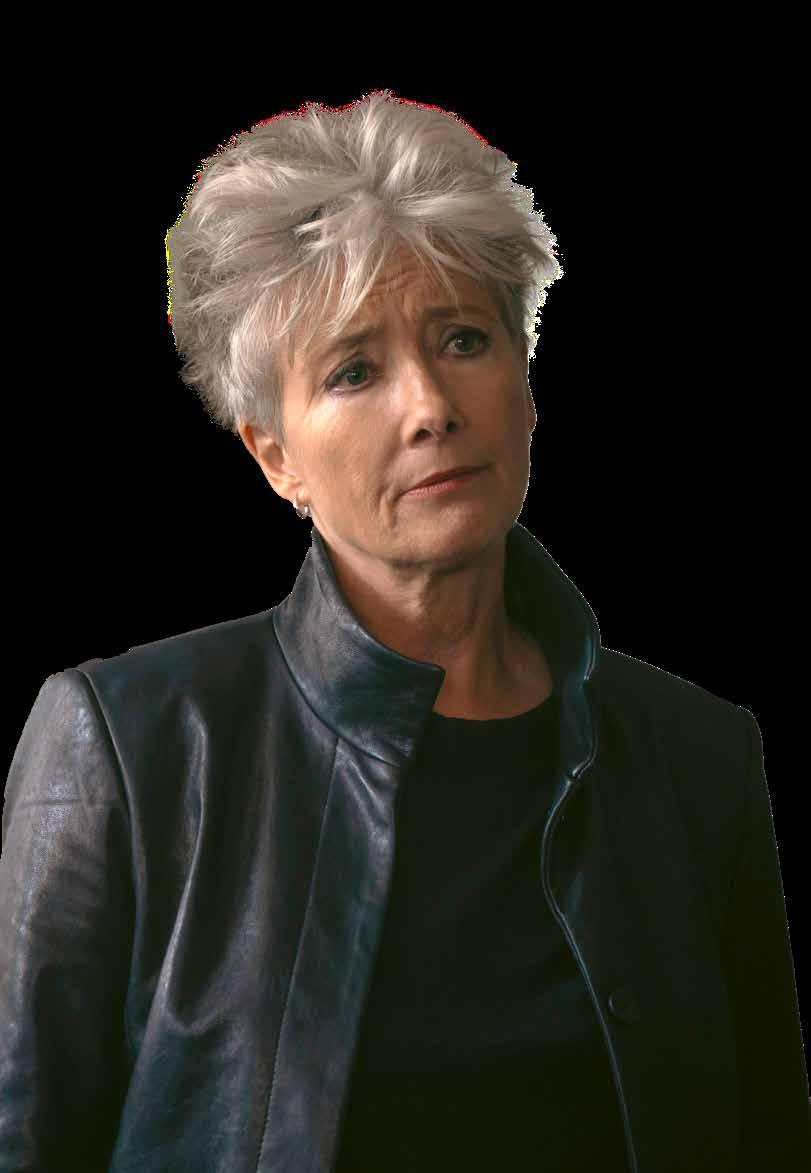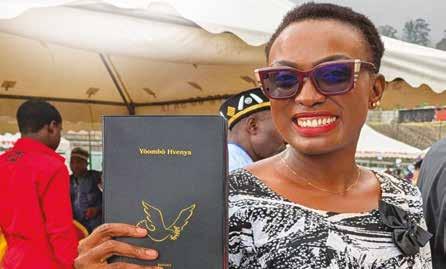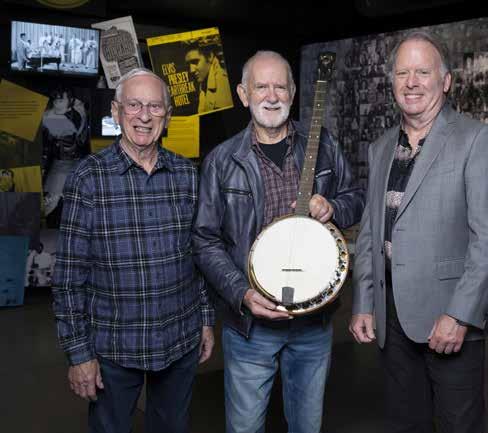Big bang theories
Private investigator looks for clues to explosion in TV drama
Priest reveals what makes her TikTok



Private investigator looks for clues to explosion in TV drama
Priest reveals what makes her TikTok


The Salvation Army is a Christian church and registered charity seeking to share the good news of Jesus and nurture committed followers of him. We also serve people without discrimination, care for creation and seek justice and reconciliation. We offer practical support and services in more than 700 centres throughout the UK. Go to salvationarmy.org.uk/find-a-church to find your nearest centre.
The Salvation Army first published a newspaper called the War Cry in London in December 1879, and we have continued to appear every week since then. Our name refers to our battle for people’s hearts and souls as we promote the positive impact of the Christian faith and The Salvation Army’s fight for greater social justice.
Editor: Andrew Stone, Major
Deputy Editor: Philip Halcrow
Staff Writer: Emily Bright
Staff Writer: Claire Brine
Staff Writer: Ewan Hall
Editorial Assistant: Linda McTurk
Graphic Designer: Mark Knight
Graphic Designer: Natalie Adkins
Email: warcry@salvationarmy.org.uk
The Salvation Army United Kingdom and Ireland Territory 1 Champion Park London SE5 8FJ
Tel: 0845 634 0101
Subscriptions: 01933 445445 (option 1, option 1) or email: subscriptions@satcol.org
Founders: Catherine and William Booth
International leaders:
General Lyndon Buckingham and Commissioner Bronwyn Buckingham
Territorial leaders: Commissioners Jenine and Paul Main
Editor-in-Chief: Major Julian Watchorn
weekly by The Salvation Army © The Salvation Army United Kingdom and Ireland Territory ISSN 0043-0226
The Salvation Army Trust is a registered charity. The charity number in England, Wales and Northern Ireland is 214779, in Scotland SC009359 and in the Republic of Ireland CHY6399.
The world’s bestselling book of all time has become available to millions more people in their first language over the past year, a news item in this issue of the War Cry reveals. The story tells how research by Wycliffe Bible Translators found that the number of viable languages that had no Bible translation at all fell from 985 to 550.
While Bible translators are enabling people to read the world-changing stories and poems contained in the ancient book, the Rev Pippa White is using the new medium of TikTok to explore the life of faith.
The 30-year-old priest has more than 28,000 followers on the short form video platform, where – often with humour – she offers her take on topics such as trying to be happy for a couple wanting to get married ‘when you’re freshly single’, getting things into perspective ‘when there’s no syrups for coffee’ and deciding which men from Christian history she would trust with a podcast mike.
In an interview this week, Pippa tells us about her use of TikTok to communicate with people on matters of faith and church life. She thinks it is ‘definitely worth’ trying to use social media, for instance, to improve the representation of women priests, even if it ‘is not going to solve all the misconceptions’.
But Pippa also spends her time helping people in person to see the reality about faith. She conducts baptisms, weddings and funerals and leads Sunday services. She tells us that when people who are unfamiliar with church want their babies to be christened, she takes time to explain the service and what happens in it.
And then she enjoys seeing the discovery that people make when they do step through the door of a church.
‘They realise that they can be in the church space,’ she says, ‘and engage with the idea that God loves each of us so much.’
Which is the very idea at the centre of the world’s bestselling book of all time – and which countless people are following.
When you’ve read the War Cry, why not pass it on ➔ ➔ ➔


Printed by CKN Print, Northampton, on sustainably sourced paper


Your local Salvation Army centre



Zoë

By Emily Bright
Cycling home from her work as an art conservationist in Oxford, Sarah Trafford (Ruth Wilson) slams on the brakes. A little girl has run into the road to rescue a butterfly. Sarah and the little girl smile at each other as the girl opens her cupped hands and the insect flies away.
It’s a moment of stillness and shared humanity in the first few minutes of Apple TV+ thriller Down Cemetery Road. But soon Sarah is back on her way home to prepare for a dinner party with her husband’s bank clients, where she does her best to cope with her snobby guests. Just as she reaches breaking point, there’s a big explosion nearby, smashing the windows in her home. Running down her street, Sarah sees that a house has gone up in flames. The emergency services carry out a child wrapped in a blanket. Suddenly, Sarah spots a mysterious man crossing the cordon. The next morning, Sarah deduces that the child carried out of the house
explosion was the same girl who rescued the butterfly. She feels compelled to visit the child in hospital. But the medical staff are deliberately obstructive and ask her to leave. Sarah wonders why.
From that point on, things just become stranger. And the more she digs into the circumstances around the girl, the more questions she has.
Sarah turns to sharp-witted private investigator Zoë Boehm (Emma Thompson) for help in solving the mystery.
When Zoë first meets Sarah, she cuts her down to size with scathing words. But Sarah is unfazed, and quickly realises that Zoë will be her most powerful ally in the search for answers. They are going to need to be tenacious. Their investigations are unlikely to be easy. And unearthing the truth could prove costly.
Sarah and Zoë’s quest for answers may feel familiar. Throughout life, we can
wonder why bad – though not always so dramatic – things happen to other people and even to ourselves. We may not know how to fix the situations we see around us or how to move forward from our own troubled times. Often, there are no simple answers.
But many people have found the comfort and support they need to face life’s big questions through a relationship with God.
They have discovered the truth behind God’s words recorded in the Bible: ‘When you search for me with all your heart, you will find me!’ (Jeremiah 29:13 New Century Version).
Those words remain true.
While there may be some questions we cannot answer, if we go searching for God, he’ll make himself known to us. And once found, he will always be on hand to provide the comfort, strength and sense of peace we need to face each day.
It’s a truth worth pursuing.
Premier League referee Anthony Taylor told BBC Sport that the abuse he has received as an official in high-profile football matches has led him to question his job and ask himself: ‘Is it all worth it?’
He reflected on the 2023 Europa League final between Roma and Sevilla in Hungary, and the post-match news conference in which Roma’s boss at the time, José Mourinho, summed up his team’s loss by referring to the referee and his decisions as ‘a disgrace’. Anthony also recalled having to face angry fans in Budapest airport, in full view of his family. He described it as the ‘worst situation’ of abuse he’d had to deal with.
Every one of us makes mistakes
Commenting on the ‘negative environment’ in which football officials are often working, Anthony said: ‘The amount of scrutiny ... analysis and chat around Premier League football means everybody has a quest for perfection. In reality, perfection doesn’t exist.’
I’m no football expert, but even I know that what he says is right. No one on the planet is perfect. People who demand or expect perfection from others are going to be disappointed – because, like it or not, every single one of us makes mistakes.
That’s why I’m relieved to know that God doesn’t ask me to be perfect. To tell the truth, he knows I never will be. And he’s ready to forgive me for the times I mess up.
But I also know that he loves me so much that he wants me to be the best version of myself that I can. That’s why he sent his Son, Jesus, as a perfect example of how to live.
In the Bible, I can read about Jesus’ interactions with others. He demonstrates how I should reach out to individuals who feel excluded by the people around them. He explains why I shouldn’t judge others or hold on tight to my money. He inspires me to forgive people who hurt me – and shows me how it’s done.
No matter how hard I try, I know that I’ll never be able to follow Jesus perfectly. But is it all worth it? Absolutely.

The Rev Richard Coles (pictured), whose novel Murder Before Evensong has been dramatised for Channel 5, told Radio Times that ‘vicars are very likely candidates for murder mysteries’ because they ‘get stuck in everywhere and nobody asks what you’re doing’.
Reflecting on how his years of ministry inspired him to create the character of Canon Daniel Clement, a crime-solving priest, Richard said: ‘I was in central London, then left to become a vicar of a semi-rural parish for 12 years. Everybody said, “Oh you’ll get bored. You’ll just be doing village fêtes.”
‘But there was a murder in my first week. Or rather, an alleged murder. It happens, you see. The human heart is the human heart. It’s darkness and it’s light wherever you go.’
When asked for his personal views about a scene in the drama in which Daniel prays for ‘mercy for the mystery killer’, Richard said: ‘There is always mercy for those who seek it and want it. My job as a priest would be to make it as easy as possible for anyone to find their way to it.’
Rod Davis – an original member of the Quarrymen, the group that evolved into the Beatles – holds the five-string banjo that he and John Lennon used to play and that has now gone on display at Strawberry Field.
The banjo, on loan from collector Ashley Davie (right), was unveiled at the Salvation Army site on what would have been John Lennon’s 85th birthday.
The instrument was originally owned by Rod, who played it at the Quarrymen’s early gigs.
Rod – also pictured with fellow Quarryman Colin Hanton – says that if John broke a guitar string mid-song ‘he’d grab my banjo and carry on – the chords his mother taught him worked perfectly on it’.
As well as featuring an exhibition telling the story of the former children’s home and how it inspired the Beatles song ‘Strawberry Fields Forever’, the Salvation Army site provides training for young people who face barriers to employment.
A woman with a copy of the Mokpe-language New Testament at its launch in Cameroon


Sally shop is capital winner
A Salvation Army charity shop in Walthamstow has been named the London area winner of this year’s UK Favourite Charity Shop awards, run by the Charity Retail Association.
Millions of people around the world have been given the opportunity over the past year to read the Bible in their native language for the first time, according to research by Wycliffe Bible Translators.
In its report State of the Bible 2025, Wycliffe says that last year, there were 985 viable languages which had no Bible translation at all. This year, that figure has dropped to 550. The translation work has led to 197 million people now being able to access a whole Bible in their language for the first time, and a further 54 million people having the New Testament available to them. Communities in Cameroon, Indonesia and Russia are among those who have received translations in their first language.
James Poole, executive director of Wycliffe, says: ‘For centuries, billions of people have lived without a single verse of the Bible in their language. But that story is changing. In recent years we have seen an extraordinary surge in Bible translation.’
The Sally in the Stow shop was chosen as one of the 12 regional winners by members of the public.
Major Julie Pell, co-leader of Walthamstow Salvation Army, says: ‘We are over the moon to win this award. We have a wonderful team here who have worked tirelessly to make the shop what it is today.
‘Our Sally in the Stow is more than a shop. As part of Walthamstow Salvation Army, it’s also a friendly and safe space that enables us to support many local people.’
The overall UK winner will be announced in November.

Author and pastor AMY SEIFFERT explains why gender equality and her belief in God go hand in hand
Interview
by Emily Bright

Amy Seiffert is many things – an author of books on spirituality, a pastor and a speaker. But there’s one identity that she prizes above all others: a daughter of God. In her latest book, Your Name is Daughter, she explores stories of the Bible to highlight how God values women.
‘Any other label that we put on ourselves could change, depending on life circumstances,’ she explains over a Zoom call from Ohio in the US. ‘But the name “daughter” will never change. It is a relationship to the King of Kings, and all the privileges that come with that.’
As a female pastor in an often predominantly male environment, Amy has taken reassurance from the pioneering, brave and faithful women featured throughout the Bible.
In Your Name is Daughter, she takes a look at the lives of women from a crosssection of society, including a pregnant teenager, widows, leaders, prophets, the marginalised and those struggling with chronic pain and infertility. She also highlights how God worked powerfully in their lives in the midst of a patriarchal society which saw women as secondclass citizens.
‘I started to look at all the women, named and unnamed, who were given jobs to do by God,’ she says. ‘They were out in the world, changing lives. They are not invisible, but many of us today have just chosen to pass over them.
‘Each name and story started to add up, and I thought: “These women were doing incredible things.”
‘They were also sinful women with issues. But God is not asking us – his daughters – to be flawless. He’s asking for us to be faithful with what we’ve got
and to say: “All right, God, I’m going to trust you. I’m going to listen to your voice, to step out in courage.”’
In her book, Amy also challenges some negative perceptions of women who appear in the Scriptures by taking a look at the bigger picture. Perhaps one of the best-known stories that she reframes is that of Adam and Eve in the first book of the Bible, Genesis. Much focus has been on Eve eating the forbidden fruit and leading Adam astray, prompting God to cast the couple out of the idyllic Garden of Eden and bringing about the fall of humankind.
Let’s have men and women co-leading
But Amy points out that the earlier chapters in the story show that God has a radical view of gender equality.
‘In Genesis, it says that God created man and woman “in his own image”. He blessed them both. He commissioned them to cultivate the Garden of Eden and bring beauty. Everything unravelled, but that was not the original design.
‘So let’s remake this picture of men and women created in God’s image, where there’s no hierarchy and there’s equality. Let’s have men and women, side by side, co-leading, co-creating and co-designing.’
God’s Son, Jesus, modelled such gender equality during his ministry, says Amy.
‘Jesus was countercultural,’ she
Turn to page 8 f
explains. ‘He travelled with women, who –like his disciples – were with him, hearing him preach.
‘He also taught women like Mary. She crossed cultural and gender boundaries by sitting at Jesus’ feet to learn like his disciples. And he said of her: “She has chosen a good thing. I want her to learn.”’
Mary’s sister, Martha – who was also a follower of Jesus – is sometimes perceived more negatively as someone who is distracted from Jesus’ teaching by everyday concerns. When Mary decides to sit and listen to Jesus’ teaching, Martha is busy with tasks. She asks Jesus to get Mary to help her. Jesus tells Martha not to prioritise busyness and worry over listening to him.
But Amy again reframes the picture, highlighting a different Bible passage which tells how Mary and Martha’s brother Lazarus is ill and then dies, before Jesus arrives and raises him back to life.
There’s nothing women cannot do if God calls them to it
‘When Lazarus dies,’ says Amy, ‘Martha goes straight to Jesus. She says: “If you would have been here, my brother would not have died. But I know who you are, and God will do whatever you ask.”
‘Her faith is bold and beautiful. There’s then this one-on-one conversation between Jesus and Martha, where he says: “Do you believe that I am the resurrection and the life?” And she says: “I do.”
‘It shows that she has been listening to his teaching. She knows his theology.’
Amy believes that the miracles of Jesus can also reveal how he advocates for women. In one Bible story which Amy retells, a woman who has been bleeding for 12 years touches Jesus’ cloak in the hopes of being healed. But the woman receives much more – a redefining of her whole identity.
‘When Jesus calls the woman by a name, he calls her: “Daughter.” Jesus restores her back into society by healing her from her bleeding disease. But I think calling her “daughter” changed something on her inside.’
One of the challenges of reading the Bible is understanding its cultural context. It’s a challenge that Amy tackles. She talks about Paul. One of the early

leaders of the Church, he has sometimes been a focus for feminist critics who believe that Christianity oppresses women. For instance, in one of his letters, Paul says: ‘I do not permit a woman to teach or to exercise authority over a man; rather, she is to remain quiet’ (1 Timothy 2:12 English Standard Version).
But Amy explains that context is key. ‘Paul was writing to Timothy, who at the time was in Ephesus, where there was a cult dedicated to the worship of the goddess Artemis.
‘If you worshipped Artemis, the women were in charge. But then women started to come to Christ, and Paul wanted them to learn who Jesus is.
‘Paul explains that the way to learn is to listen. Women ought to be quiet because they were learning.
‘It’s not a universal situation. Paul was doing something specific at this time for this church, for this context, for these people.’
In fact, says Amy, the Bible shows that Paul regularly championed women in leadership.
‘Over and over, Paul says how thankful he was for the women that he was leading, teaching and in jail with. At
the end of his Letter to the Romans, he names and thanks 20 people, including 10 women.
‘He was clearly doing ministry alongside women. He sent the Letter to the Romans with Phoebe, knowing that she would not only read the letter but answer any questions that people had about it.’
In her role as a woman pastor, Amy says that her relationship with God has sustained her.
‘It brings me a lot of confidence to identify as the daughter of the Most High King. If that’s what I am, I have an allaccess pass to him.
‘I want women to know that there’s nothing they cannot do if their Father God calls them to it – not necessarily because of who they are, but because of who he is.’


l Your Name is Daughter is published by Bethany House

The Rev Pippa White is not_a_priestess, her TikTok handle being a nod to the misnaming of women clergy. Through light-hearted videos on her channel – which has more than 28,000 followers – she explores church life, the Bible and what it’s like to be a priest.
Scan the 30-year-old’s recent TikTok posts and you’ll discover her celebratory dance at the appointment of the first female archbishop of Canterbury; a parody of what it’s really like to christen a baby; and a tongue-in-cheek clip about the integral
From page 9
role her dog Fred plays in her ministry in Shropshire.
Pippa believes that a down-to-earth approach can often communicate faith better than the more ‘earnest, zealous’ posts she sometimes sees online.
‘I always compare social media to real life,’ she says. ‘What I would do on the high street in my parish is the same as what I’d do online.
‘If I’m waiting next to someone in a coffee shop queue, I’ll make a little quip
to start the conversation, rather than giving them the hard sell on faith. I think approaching people with humour works online as well.’
It appears that people are becoming increasingly receptive to conversations about the Christian faith. In recent months, news outlets have reported on a ‘quiet revival’ in the UK among Gen Z –those born between 1997 and 2012. It’s a trend that Pippa has spotted on social media herself.

‘Young people today are very curious about faith and religion –particularly Gen Z, as they are facing many challenges which other generations haven’t really faced within living memory,’ she says. ‘Gen Z are experiencing a higher anxiety about climate change and they’re sceptical about institutions. And when your childhood has been formed by things like Covid, you’ll want to find something that gives you hope.
‘Although people maybe aren’t 100 per cent sold on Christianity, they are thinking: “OK, I’ll pop my head round the door to have a peep at what’s going on here.”’
Pippa says that her own exploration of faith was initially tentative too.
‘Looking back, I had always been a Christian but just not realised it,’ she says. ‘I thought of myself as spiritual, not religious. I was tiptoeing around it.
‘Growing up, we weren’t baptised or made to go to church. But our family did go at Christmas and Easter. I remember feeling very comfortable in church, and I had this sense that there was something bigger out there – although I didn’t have the structure or language of what I see now as God.
‘Then, when I was at uni, I started going to churches, and I thought that maybe I’d take it more seriously.’
When she was 19, while
talking about career options with her boyfriend at the time, Pippa wondered out loud about becoming a vicar. She sees that moment as being pivotal in determining the direction of her life.
‘That was the moment when God was like: OK, I’m going to put up a big neon sign for you here,’ she remembers.
The idea of becoming a vicar stuck. But receiving her calling to ministry at just 19 years of age posed its own challenges.
‘As a teenager,’ she explains, ‘you’re just starting to work out who you are, forging your own path in the world. I felt like I hadn’t even gotten to know me, and yet here I was, going to become a priest.
‘I didn’t know what the priesthood looked like either. Do I sit in a chair and read the Bible all the time? What actually is my day-to-day life?’
If you let God direct you, life will be richer
As the curate for the parishes of Fauls, Tilstock and Whitchurch, Pippa’s day-to-day life now includes the conducting of baptisms, weddings, funerals and Sunday services.
‘I enjoy working with people and seeing when the penny drops for them that they are loved,’ she says. ‘In this corner of Shropshire, people traditionally get their babies christened, even if they don’t come to church. So I deconstruct the service for them – I explain why we use water and talk about all the other different elements of a christening.
‘It’s amazing when you see people losing themselves in the service as their resistance stops. They realise that they can be in the church space and engage with the idea that God loves each of us so much.’
Pippa’s work also brings the fragility of life into sharp focus.
‘A huge part of my job is conducting funerals, so I see the full circle,’ she says. ‘I believe that all life comes from God, and if you let God direct you, life will be so much richer. Then, one day, you will return to him.’
Away from church buildings, Pippa joins schools for worship, leads a hospital chaplaincy team and serves as chaplain for a squadron of air cadets.

In her spare time, she plays rugby and rides horses – subverting some people’s idea of a typical priest.
‘You can forget what a lot of people think about church,’ she says. ‘It’s important for me to pull myself out of the church bubble through my hobbies. Being a priest, you live and view life in certain ways, but that doesn’t mean you’re locked up in church 24/7.’
Pippa also seeks to use social media to improve representation of women priests. When she was exploring her vocation, she recalls, there were no obvious role models to turn to for advice.
‘I struggled to find young female priests who I could ask about the life of a vicar. So it’s important that women are online. But I think we have to keep our eyes open. Social media is not going to solve all the misconceptions about female priests.
‘And it can be tricky, particularly with
platforms like TikTok where the algorithm is so specific and personalised. The danger is that you can end up preaching to the converted, because if someone is already interacting with that kind of content, the algorithm will send them more.
‘But I still think posting on social media is definitely worth a good college try.’
With her TikTok posts, Pippa is also keen to tackle ‘a misconception among young people, and particularly young women, that feminism and Christianity are mutually exclusive’.
She says: ‘A big idea – particularly in the western world – is that women have to take their brains out to interact with religion. And I think the truth is the opposite.’
To illustrate her point, Pippa offers examples from the Bible of how Jesus empowered women.
‘He was so willing for women to be messengers of his gospel,’ she says. ‘And when he talked to the Samaritan woman, he was choosing to share the truth of who he was with someone of the least social standing. Christ is for all of us.’
One of Pippa’s favourite things about posting on TikTok is when people leave comments that her video has encouraged them in their faith.
‘I’ve seen comments where people talk about how they’ve given up on church, but then they realise that maybe church isn’t all that bad,’ she says. ‘It’s those glimmers that I pray into, that people are opening their hearts up again.’
Your prayers are requested for Winifred, who is unwell and in hospital.
The War Cry invites readers to send in requests for prayer, including the first names of individuals and details of their circumstances, for publication. Send your Prayerlink requests to warcry@salvationarmy.org.uk or to War Cry, 1 Champion Park, London SE5 8FJ. Mark your correspondence ‘Confidential’.
Christian
There is no set formula to becoming a Christian, but many people have found saying this prayer to be a helpful first step to a relationship with God
The last book of the Old Testament, Malachi, was written after the rebuilding of the Temple in 516BC. Malachi’s prophecy is a mixture of good and bad news.
He starts with the good. Through the prophet, God reminds the people of Israel of his love for them.
Then follows the bad news. When it comes to sacrifices, God requires animals that are without defect. But the people are offering blind, crippled or diseased animals. God considers this cheating and an insult (1:6–14).
The priests have fallen short of God’s standards. Not only are they allowing substandard sacrifices, but their teaching of the Law is also second-rate (2:1–9).
People are falling back into old sins. Despite copious warnings from prophets such as Isaiah, Jeremiah and Hosea, God had punished Israel by sending it into exile because the people had married foreigners and worshipped their gods. Years later, Malachi says that it is still happening and God is displeased (2:10–16).
Lord Jesus Christ,
I know that I have done things in my life that are wrong and I’m sorry.
Thank you that I can ask you for forgiveness because of the sacrifice you made when you died on the cross.

Please forgive me and help me to live a better life in the future as I learn how to love you and follow your way of living.
Thank you, Lord Jesus.

In their financial giving, people are short-changing God and are questioning whether their faith is worth the effort (3:6–15).
Even though the place of worship – the Temple – has been rebuilt, it is the purity of worship that still needs working on. Help, though, is at hand.
A day is coming when ‘all the arrogant and every evildoer will be stubble’, while, for those who revere God’s name, ‘the sun of righteousness will rise with healing in its rays’ (4:1 and 2 New International Version). In the light of this, God implores his people to keep the faith (4:4).
There is more good news. Before the day of God’s reckoning comes, he will send a messenger – ‘the prophet Elijah’ (4:5) – to prepare the way. The Lord ‘will come to his Temple; the messenger of the covenant, whom you desire, will come’ (3:1).
This reference to the Messiah is the last word from God recorded in the Bible until John the Baptist, the forerunner for Jesus, appears in the wilderness, crying: ‘Prepare the way for the Lord’ (Matthew 3:3).

If you’ve prayed this prayer, scan the QR code or contact us using the coupon on this page

































































To receive basic reading about Christianity and information about The Salvation Army, complete this coupon and send it to
War Cry 1 Champion Park London SE5 8FJ


















Tannadice Park is the home ground of which Scottish Premiership football club?
Which car was introduced to the UK in 1991 with a TV advert featuring ‘Nicole’ and ‘Papa’? 1 2 3 4 5 6
Which pointillist artist painted A Sunday on La Grande Jatte?
‘To begin at the beginning’ are the opening words of which radio play by Dylan Thomas?
The Italian city of Firenze is known by what name in English?
Sheku Kanneh-Mason is a virtuoso soloist on which instrument?

It’s time for the 40th anniversary re-release of a blockbuster
Film feature: Back to the Future in cinemas from 31 October
By Ewan Hall
Great Scott! Back to the Future is returning to the big screen to celebrate its 40th anniversary. And, for the first time, cinemagoers can experience the film in the most up-to-date formats, including Dolby Cinema, 4DX and D-Box.

The return of the Academy award-winning blockbuster invites audiences to revisit 1985 and the fictional Hill Valley, California, where, in helping his scientist friend Doc Brown (Christopher Lloyd) to test his time machine, teenager Marty McFly (Michael J Fox) is accidentally sent back to 1955.
Travelling back in time may sound exciting. But there’s a problem. Marty’s arrival disrupts the moment when his parents were meant to fall in love, putting his very existence at risk.
Desperate to fix things, he seeks help from a younger Doc Brown. Together, they work to bring Marty’s parents together and return him to the future.
Throughout the film, Marty is a man out of time. His pop culture references are misunderstood. After giving a guitar-screeching performance of Chuck Berry’s ‘Johnny B Goode’ at a high-school dance, he tells the bemused audience: ‘I guess you guys aren’t ready for that yet. But your kids are gonna love it.’
Thrown into a completely unfamiliar world, Marty has to navigate relationships, cultural norms and historical events, knowing that one wrong move could erase his future.
Forty years on from its original release, Back to the Future is still well loved – perhaps partly because people can relate to Marty’s apprehension at the unknown. When we’re starting a new job, moving house, becoming a parent or facing any new situation, we’re unsure of what to do. We try to make sense of it all, hoping we don’t mess up.
But there’s good news. We’re not alone in the unfamiliar. God doesn’t wait for us to have it all figured out. He’s already beside us.
Way back in time, God reassured people who were unsure about what lay ahead for them by saying: ‘When you have troubles, I am with you’ (Isaiah 43:2 Easy-to-Read Version).
If we place our trust in him, we can know his guidance and support in every unknown experience we encounter – now and into the future.

ACROSS
1. Timepiece (5)
4. Performed (5)
8. Santa’s helper (3)
9. Foundation (5)
10. Knock over (5)
11. Couple (3)
12. Discourage (5)
13. Quick retort (7)
16. Eatable (6)
19. Affront (6)
23. Disaster (7)
26. Competed (5)
28. Riotous crowd (3)
29. Hesitate (5)
30. Ooze (5)
31. By way of (3)
32. Abrupt (5)
33. Answer (5)
2. Beginning (5)
3. Falcon (7)
4. Able to buy (6)
5. Whack (5)
6. Sediment (5)
7. Evaluate (5) 9. Emblem (5)

15. Large cask (3)
17. Owing (3)
14. Away (3) 22. Take away (6) 23. Storehouse (5) 24. Not sharp (5) 25. Applaud (5)
18. Bleat (3)
20. Refrain from (7) 21. Evade (5)




200g potatoes, cut into bite-sized pieces
2tbsp vegetable oil
10g fresh ginger, grated
1tsp ground coriander
Black pepper, to taste
2tsp curry powder
Pinch chilli flakes
200g onions, roughly chopped
1 garlic clove, roughly chopped
30ml apple juice
500g can chopped tomatoes
1tbsp tomato puree
200ml water
300g courgettes, sliced
200g red pepper, roughly chopped
50g natural yogurt
10g fresh coriander
Salt, to taste

Boil the potatoes until just tender and drain.




Place a large pan over a medium heat and when hot, add 1tbsp oil, followed by the ginger, coriander, black pepper, curry powder, chilli flakes, onion and garlic. Sauté for 10 minutes, until the onions become translucent and soft.
Add the apple juice to deglaze the pan, followed by the tomatoes, tomato puree and water.
Bring to the boil and reduce the heat. Simmer gently for 10-15 minutes.
While the sauce is simmering, add the remaining 1tbsp oil to another large pan over a medium heat and when hot, sauté the courgettes, red pepper and cooked potatoes until they start to colour.
After 10-15 minutes, remove the sauce from the heat and puree with a blender until smooth.
Add the curry sauce to the vegetables along with the yogurt and fresh coriander and simmer gently for 5 minutes. Season, to taste, before serving.

Psalm 62:5 (New Living Translation)